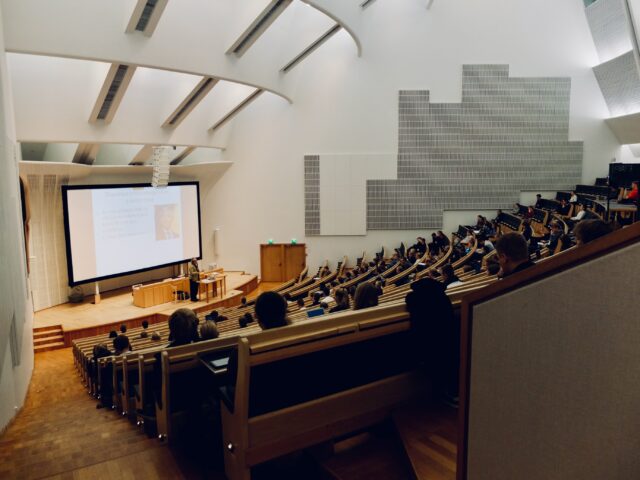The Government of Canada has announced several initiatives intended to bolster its economy and build a more confident workforce. These include a $5B investment into a new Strategic Response Fund, a $450M investment through Labour Market Development Agreements to retrain and upskill 50,000 workers, as well as a $50M investment into a project involving eCampus Ontario and the Skills Council of Canada to modernize its online job tools. “We are charting an economic strategy to move Canada from reliance to resilience, from uncertainty to prosperity,” said Prime Minister Mark Carney. Advocacy groups such as Colleges and Institutes Canada and Colleges Ontario noted the importance of investing in retraining and upskilling workers in a period of economic uncertainty and emphasized the role that the postsecondary sector plays in this process.

Top Ten News
September 9, 2025
First Nations University of Canada has officially launched its Career Centre, which will provide career coaching, mentorship, networking, and professional development opportunities to students. The Centre is supported through a partnership with Co-operators, which is investing $390K over three years and plans to hire three students each year. “The Career Centre will be a space where Indigenous students are further uplifted and supported into their next transition – the workforce,” said FNU President Dr Jacqueline Ottmann. “[It] will serve as a bridge between the university and the workplace, supporting the evolution from student to working professional.”
Concordia University, Niagara College, and York University have each received Living Campus certifications from the World Wildlife Fund Canada for the second year in a row. This certification recognizes postsecondary institutions which have taken meaningful action on conservation, sustainability, and community engagement. “This certification reflects the impact of those changes and the way our community has rallied around biodiversity as a shared value,” said Concordia Office of Sustainability Urban Agriculture and Biodiversity Coordinator Jackie Martin.
In a recent article for The Conversation, Alice Brown (University of Southern Queensland) discusses how the move away from in-person lectures may benefit students. Brown explains that online learning improves access to students who may be unable to attend class in person due to factors such as care responsibilities or disabilities, and underscores how online tutorials and recordings can benefit students with different learning styles or English as a second language. To address the concerns about losing connection with others, Brown encourages instructors to ensure that remote learning includes social and collaborative engagement opportunities. Examples of these engagements include structured social time before tutorials, using break-out rooms for group work, and fostering discussions online.
The University of Regina has reopened its AdHum Pit—a central space in its Administration Humanities building—following a major renovation. The space was updated to include flexible seating, improved lighting, additional power outlets, and an expanded capacity for future events. It is decorated with Indigenous art pieces and a steel sculpture celebrating URegina’s 50th anniversary. URegina Associate Vice-President of Indigenous Engagement Lori Campbell emphasized the importance of the art pieces in helping Indigenous students see themselves reflected in the spaces where they learn and gather “When Indigenous art and stories are visible on our campuses, it sends a clear message that Indigenous people are present,” said Campbell.
Université du Québec à Montréal Recteur Stéphane Pallage has called on the Government of Canada and Government of Québec to abolish their respective international student caps or offer exemptions. Pallage asserted that the message being heard around the world is that QC wants fewer international students, creating uncertainty among prospects. He further noted QC’s desire to improve French-language usage in the province’s capital and asked who would be better positioned than UQAM to welcome Francophone and Francophile students from around the world to Montréal. He urged the governments to regard universities as places of francization and integration that can attract the best minds in the world.
Providence University College recently spoke to CBC about the measures it has taken in response to the international student cap. Providence has reportedly received 120 PALs this year, which CBC reports is a nearly 90% reduction in provincial attestation letters (PALs) received from the Government of Manitoba. “We’re not impressed with the provincial government,” said Providence Provost Nicholas Greco. “We would like more.” The institution reportedly requested 600 more for this year, but was only given 30 additional PALs. The institution has sold a downtown Winnipeg property that it originally purchased with the intent of growing its programming and has adjusted its programming to account for the loss of the cap exemption for international graduate students.
Six Nations Polytechnic has renamed its affiliated private high school the Six Nations Polytechnic Secondary School. The high school is a branch of SNP that ensures students can prepare for and transition to postsecondary education while staying in the same supportive learning environment. SNP says that the new name for the school better reflects its growing student population, program offerings, and commitment to the learning experience. The unveiling event brought together educational partners, community members, and other supporters for refreshments, a cake-cutting ceremony, and conversations.
The Canadian Digital Learning Research Association has officially released the 2025 Pan-Canadian Report, which explores the results of the CDLRA’s annual Digital Learning Trends Survey and a student survey conducted by Academica Group. The report examines trends in digital learning and asserts that the majority of staff and faculty respondents expect growth in online and hybrid learning over the next two years. The researchers note that student participation in online learning appears to be primarily driven by the need to balance competing personal priorities, a desire for cost savings, the affordability of housing, and access to reliable transportation. OER awareness has remained unchanged over time. The authors assert that institutional financial stability, enrolment shifts, AI policy and strategy development, and academic integrity were flagged as being the most pressing challenges facing higher ed on this front.
Conestoga College has purchased a property in downtown Guelph. The property has been the subject of a lengthy development dispute, according to GuelphToday. Once planned to be the location of the tallest building in the city, the site was subject to a series of city council discussions where multiple developer proposals were rejected. The site—now home to a three-storey commercial building—was sold to the college in December. Conestoga has reportedly not revealed any development plans for the property at this time.
